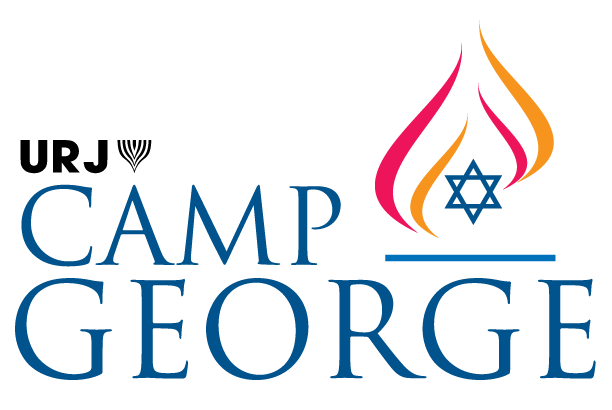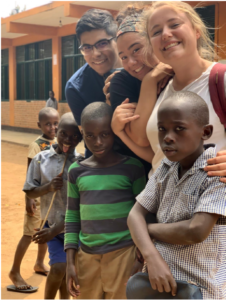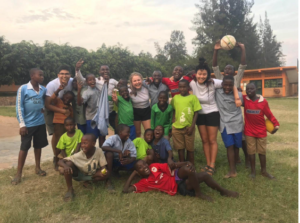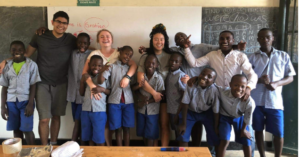By: Veronica (Ronnie) Botnick, alumna
This past summer was the first summer in 10 years that I was not at Camp George. I knew this was going to be my fate in September when I enrolled in a course called “Rwanda: Culture, Society, and Reconstruction”. Along with Professor Henri Boyi, a fellow Camp George Alumni, Misha Apel, and 12 other enthusiastic students, I learned about the people of Rwanda in a class on Western’s campus, to in person for 5 weeks in Rwanda.
Growing up in Mississauga, I noticed that many people’s only understanding of Jewish life was centred around the Holocaust. That perception of Jewish life always threw me off because every summer I would be surrounded by my best friends at URJ Camp George, who were also Jewish, but we rarely brought up the Holocaust. Those summers were my true understanding of reform Jewish life. It was during Project Barak when I realized that Jewish life (in Canada, Poland, and Israel) spans further into amazing culture and community, rather than only coined to the genocide. Camp George exposed to Jewish life around the round from bringing in Shinshinim (Israeli staff) from Israel to activity periods about the culture. The Shinshinim and activity periods about Israel showed me that Jewish life in Israel is thriving, and is not “just another war torn desert” as it is presented in the media. This realization inspired me to spend a semester abroad in Israel with Heller High (formerly known as EIE) to learn and live alongside modern Jewish life.
The summer after my return from Israel, Misha Apel had just returned from her first trip to Rwanda and only spoke good things. I knew then that when I got to university I had to take that course. At that moment, my only knowledge of Rwanda had been the 1994 genocide against the Tutsis. I had to learn more about the society, as I had learned that a genocide does not represent a people. I had to go for the same reason I loved camp; to create a different narrative of a people and a culture in my head, aside from the mainstream knowledge presented in the media of the genocide.
Fast forward 3 years to this semester. Our professor’s goal was to show that (just like Israel), the country of Rwanda has a strong sense of community and is blooming with culture. He believes that Rwanda is the best example of reconstruction and forgiveness. The country needed to start all over after the genocide, but did so from the ground up. There is an overall idea of forgiving thy neighbour to create a stronger community. Upon the first few days of our arrival, we went to the “Kigali Genocide Memorial”. The weeks we were there was during the 25th anniversary of the genocide, and for 100 days, school took part in parades and individuals came forward to share their stories.
During the weekdays, the group was split up into 3 different groups to work with local NGOs Marembo, InspireRwanda, and Les Enfants de Dieu. I was put with “Les Enfants de Dieu“ (EDD) along with my classmates and now good friends Kayla and Mickey. EDD is a rehabilitation centre for boys who have been living on the streets of Rwanda. While remaining secular, the name The Children of God represents the security and compassion given to these boys and removes the negative connotations around the slur “street boys,” helping them realize they are worth more than people in society think of them. The centre focuses on protection, rehabilitation and reintegration. They offer security to a boy willing to leave the streets by removing him from street life and offering them nutrition, safe housing and health care. They care for and strengthen both the children’s physical and mental health through activities, education, psychosocial care and vocational skills that will set them up to become valuable members of society. When a boy is ready, the centre helps him reintegrate into society by reuniting him with his family, finding him a secure foster home or helping him find a job upon graduation, whichever is best suited for him.
My 5 weeks at the centre was more than fun. In the mornings, we would sit in on their classes at school, and in the afternoon we participated in their activity periods, such as art, sport, and laundry. They boys have so much confidence in everything they do, from trying to solve any math equation in class to practising their volleyball and dance skills. Around them , I felt like I could do anything and they would support me whether I failed or not. In such a short amount of time, I felt like these boys were my brothers. Although I was not at Camp George, the sense of community at EDD reminded me of my connections with the people at camp.
In Rwanda, “ubuntu” is an African philosophy that says “I am a person because you are a person, my humanity is tied to yours”. This philosophy is immediately reflected in the three centres. These organizations employ people who are passionate about working with other people and see others as just people, not street kids, or anything else. One person, Gratien, is the ubuntu reflected into a person. He is a teacher there, whom I am so lucky to call my good friend today. He is a 22 year old who has committed his life to teaching the boys at the centre math, english, kinyarwanda, and social studies. One day, Kayla and I asked him how the centre knows when a boy is ready to transition back into his home. I will remember his answer for the rest of my life. He said that to start off, one cannot see a person for their mistakes. It is easy to blame parents for letting their kids end up on the street. But, as a society, we must take a step back and see how as a whole we may have driven the parents towards this decision and how we can fix each other as a community to prevent this in the future. All of our humanity is tied to each other, and putting the blame on each other when we don’t know their story will not let us grow together as a people. From there, the transition back home is a much smoother process where both sides are willing to work together. I was especially impressed with his answer when I later learned that he too was a boy at the centre. One would imagine he resents his parents for leaving him at a young age, but Gratien is so thankful for the opportunities EDD has brought him and believes his parents did what was best for them. He is currently a student at Mount Kenya University, pursuing his passion in teaching.
This philosophy reminds me of a Jewish concept, “tikkun olam”, which translates to “repairing the world”. Upon my return from Rwanda, I strive to be as selfless as the citizens and do my best to help those around the world. Recently, Gratien has put a stop on his personal life to help out an old friend. Kayla, Mickey and I have put together a campaign to help him out. We would appreciate it if anyone could give it read and share his story, found here. If you are interested in reading more about my class’ trip to Rwanda, here is our class blog.
Thank you to my big family at URJ Camp George for inspiring me to learn more about the different cultures around the world with open eyes. I know I take this family with me everywhere I go, along with the concepts of tikkun olam and ubuntu.



